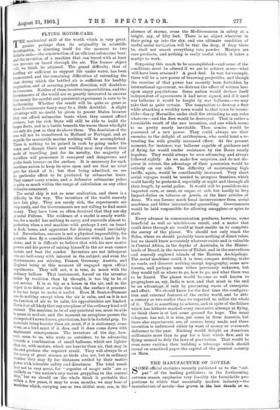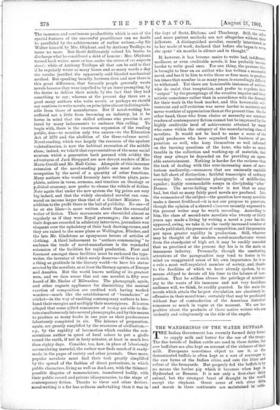THE MANUFACTURE OF NOVELS.
SOME official statistics recently published as to the "out. put" of the leading publishers in the forthcoming autumn season emphasise very forcibly the formidable pro- portions to which that essentially modern industry—the manufacture of novels—has grown in the last decade or so.
The immense and continuous productivity which is one of the special features of the successful practitioner can no doubt be paralleled by the achievements of earlier writers,—by Sir Walter himself, by Mrs. Oliphant, and by Anthony Trollope, to name no more. But Scott deliberately coined his brains to discharge what he considered a debt of honour ; Mrs. Oliphant turned hack writer, more or less, under the stress of yes angusta flomi ; while of Anthony Trollope all that can be said is that if he regularly wrote so many hours and so many words a day the results justified the apparently cold-blooded mechanical method. But speaking broadly, between then and now there is this great difference, that formerly people generally wrote novels because they were impelled to by an inner prompting, by the desire to deliver their minds, by the fact that they had something to say; whereas at the present day there are a good many authors who write novels. or perhaps we should say continue to write novels, on principles almost indistinguish- able from those of manufacture. But if novel-writing has suffered not a little from becoming an industry, let it be borne in mind that the skilled artisans who practise it are lured by many inducements to embrace this calling. To begin with, there is the enormous expansion of the reading public, due—to mention only two causes—to the Education Act of 1870 and the abolition of the three-volume novel. Novel-reading, which was largely the resource of the opulent valetudinarian, is now the habitual recreation of the middle class ; indeed, we take it that representatives of the same social stratum which a generation back perused with avidity the adventures of Jack Sheppard are now devout readers of Miss Marie Corelli and Mr. Hall Caine. Alongside of this immense extension of the novel-reading public one must note the usurpation by the novel of a quantity of other functions. Many authors who would formerly have written plays, pam- phlets, satires in verse, sermons, and treatises on theology or political economy, now prefer to choose the vehicle of fiction. Note again that under the new system the big prizes are very big indeed, and that the widely circulated novelist can com- mand an income larger than that of a Cabinet Minister. In addition to the profit there is the bait of publicity. No one—if he or she likes—is more written about than the successful writer of fiction. Their movements are chronicled almost as regularly as if they were Royal personages; the names of their dogs are recorded in adulatory interviews, journalists wax eloquent over the upholstery of their back drawing-rooms, and they are raised to the same plane as Wellington, Blucher, and the late Mr. Gladstone as eponymous heroes of articles of clothing. A third inducement to "authors commencing" to embrace the trade of novel-manufacture is the wonderful extension of the facilities for rapid production. First and foremost amongst these facilities must be reckoned the type- writer, the inventor of which surely deserves—if there is such a thing as gratitude in the literary world—to have his statue erected by the novelists, or at least the literary agents, of Europe and America. But the world knows nothing of its greatest men, and we dare swear that not one novelist in fifty ever beard of Mr. Sholes of Milwaukee. The phonograph, again, and other cognate appliances for diminishing the manual exertion of composition are credited with having worked wonders—much like the establishment of " boundaries " at cricket—in the way of enabling contemporary authors to hus- band their energies and multiply their masterpieces. It is even alleged that some gifted romancers of to-day are able to dic- tate simultaneously into several phonographs, and by this means to produce as many books in one year as their predecessors laboriously completed in six. The labours of preparation, again, are greatly simplified by the resources of civilisation,- e.g., by the rapidity of locomotion which enables the con- scientious author in quest of local colour to put a girdle round the earth, if not in forty minutes, at least in much less than eighty days. Consider, too, how, in place of laboriously accumulating material, the author now finds much of it ready- made in the pages of society and other journals. Once more, popular novelists must find their task greatly simplified by the spread of the fashion of direct portraiture, in which public characters, living as well as dead, are, with the thinnest possible disguise of • nomenclature, transferred bodily, with their public record and private idiosyncrasies, to the stage of contemporary fiction. Thanks to these and other devices, novel-writing is a far less arduous undertaking than it was in I
followers. A distinguished novelist, recently interviewed as to her mode of work, declared that before she began to write she vent " six months in silence and in thought."
the days of Scott, Dickens, and Thackeray. Still, the ark, and more patient methods are not altogether without their
If, however, it has become easier to write bad, hull mediocre, or even creditable novels, it has probably become harder to write good ones. For one thing, the pressure that is brought to bear on an author who has written a successful novel, and has it in him to write three or four more, to produce teraimes that number in as many years, is exceedingly difficult to withstand. Yet there are honourable instances of author who do resist that temptation, and prefer to regulatee their " output" by the promptings of the creative impulse and their artistic conscience rather than in accordance with the demand for their work in the book market, and this honourable self- restraint and self-criticism was never harder to maintain and
constant
never worthier of appreciation than at the present time. On the other hand, those who from choice or necessity are
readers of contemporary fiction cannot but be impressed by the highly creditable level of achievement. attained by many who come within the category of the manufacturing class of novelists. It would not be hard to name a score of the rapid producers who have organised the business of pre.
paration so well, who keep themselves so well informed on the burning questions of the hour, who take so much trouble in the collection and working-up of materials, that they may always be depended on for providing an agree- able entertainment. Nothing is harder for the reviewer than the task of dealing with this ever-increasing mass of meri. torious mediocrity,—romances that are eminently readable but fall short of distinction ; faithful transcripts of ordinary everyday life ; conscientious photographs of middle-class squalor; highly commendable essays in discipleship "after" Dumas. The never-failing wonder is riot that so many bad, but that so many fairly good novels are produced. Into the economics of the subject—the question how many novelists make a decent livelihood—it is not our purpose to penetrate, though the opinion of a shrewd observer recently expressed to the present writer may be worth recording. According to him, the class of second-rate novelists who twenty or thirty years ago made a living by writing a novel a year has die. appeared, owing, we take it, to the vastly increased number of novels published, the pressure of competition, and the premium put upon greater rapidity in production. Still, whatever may be thought of the modern novel-manufacturer viewed from the standpoint of high art, it may be readily conceded that as practised at the present day his is in the main an innocuous industry. Personally, though the unrelenting attentions of the paragraphist may tend to foster in his mind an exaggerated sense of his own importance, he is as a rule a most well-regulated member of society, and, thanks to the facilities of which we have already spoken, by no means obliged to devote all his time to the labours of com- position. That he seldom abuses the privilege of minister- ing to the wants of his immense and not very fastidious audience will, we think, be_readily granted. In the main the novels which attain the largest circulation are absolutely in- offensive in their moral tone ; certainly that may be predicated without fear of contradiction of the American historical romances so much in vogue at the moment. We are less positive about the products of those native writers who are violently and voluptuously on the side of the angels.



































 Previous page
Previous page